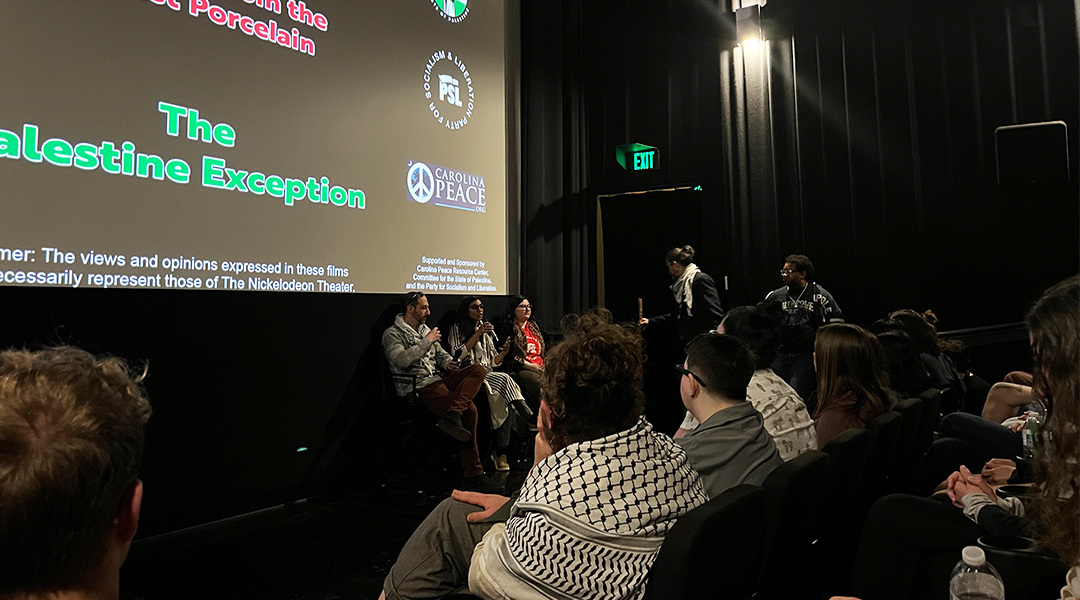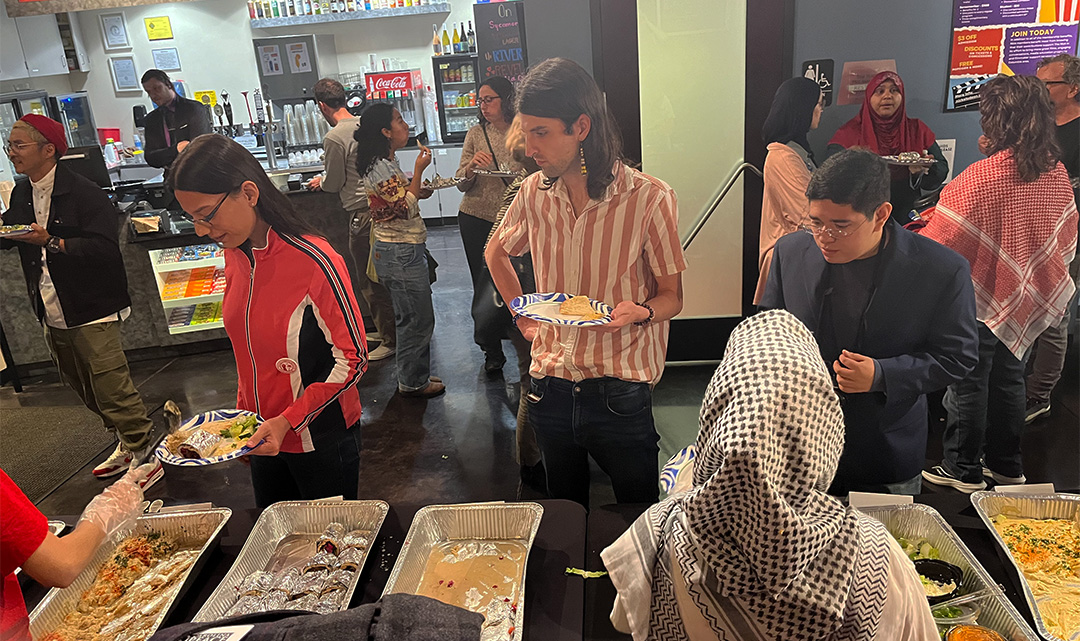A person in a Palestinian scarf, called a Keffiyeh, listens to the panel (Photo by Eva Flowe/Carolina News and Reporter)
A full house at the Nickelodeon Theatre on Tuesday gathered to watch three short films about Palestinians, who are in the news because of the Israeli-Hamas conflict.
Israel has been at war in Gaza since October 2023, after a surprise attack on Israeli citizens by Hamas, a Palestinian militant group, just outside Gaza. The debate about which side has been more inhumane has entered domestic politics in the United States, as Israel has fought back, catching Gazan civilians in the crossfire.
“I love that events like (this showing) are happening,” said attendee Julien Stansell. “I’m very excited to see a lot of political motivation in Columbia specifically, and to see that people are wanting to stand up against injustice.”
A pair of University of South Carolina professors as well as a Palestinian activist led a post-screening discussion that was heavily critical of Israel.
The sold-out event was organized by the local Party for Socialism and Liberation, the Committee for the State of Palestine and Carolina Peace Resource Center.
Josef Olmert, a USC professor who has served in senior positions in the Israeli government, said he didn’t learn about the event until the day before, after it had sold out. He said he wrote a letter of protest to the Nickelodeon Theatre.
‘I’m even eager to discuss it, but then I think that the discussion should take place in an objective and balanced way,” Olmert said. “If there is a program that presents only the Palestinian side, it should also include the possibility for the peripheral side to express themselves.”
He also said he has a problem with some of the anti-Israel rhetoric used by Palestine activists, which calls for the destruction of the Jewish-run state of Israel.
A disclaimer on event materials for the event said, “The views and opinions expressed in these films do not necessarily represent those of The Nickelodeon Theater.”
The showings were held during Ramadan, a holy month in the Muslim faith when many Muslim people fast during the day. According to the Palestine Children’s Relief Fund, 98% of Palestinians are Muslim. The event provided space to pray and a community meal, so religious attendees could break their fast.
Sarah Waheed, a historian of South Asian history and culture at USC, chose the films played at the event. She said it was hard to pick from the wealth of films about Palestine.
The final documentary was “The Palestinian Exception,” a documentary from the media outlet Al Jazeera that was co-produced by Waheed’s sister, Amina Waheed. The documentary was released March 25, so the audience at the Nick was one of the first to see a screening.
The film follows Palestinian activists at Columbia University in New York City as they organize protests, argue with administrators and have their likenesses enlarged and driven around the school on trucks, attracting ridicule and threats.
Joshua Cooper, a USC math professor and Jewish Voice for Peace organizer, was a panelist. He said the film was impactful to him as an educator.
“I’ve been largely protected from any kind of professional consequences. I’m a tenured professor at USC,” Cooper said. “But I have certainly known students who have been harassed in various ways. It makes me afraid because I see what administrations – when incentivized to crack down on Palestine speech – what they’re capable of.”
The other two films were not documentaries. “The Place” (2021) is just over a minute long, showing a Palestinian family being removed from their house as they describe what they love about it.
“In the Future, They Ate from the Finest Porcelain” (2015) is a science-fiction film about the importance of archaeology and mythology to national identity.
“Cultural engagement with the struggle for liberation and Palestine is very important,” event volunteer Andres Gonzalez said. “It can’t always be angry all the time. In order to cultivate that anger and that passion, you have to add other things in there like soul, art and education.”
Alhasan encouraged the audience after the film to analyze the history of Israel, which was created in 1947 by World War II’s victors out of the former state of Palestine, then part of the British Empire.
“We can’t just support Palestine and be on the streets,” Alhasan said. “We really have to understand Palestine from a settler-colonial perspective and understand Palestine as an anti-imperialist struggle.”
The event organizers hope to have more film screenings around South Carolina in the future.
Waheed said she thinks other film topics about the South Asian and Arab world would benefit the community. She hopes showing films around the state will help bring unheard stories into the spotlight.
Waheed said that political films don’t have to be “preachy.”
“I think films can actually bring out much more complex and nuanced conversations,” she said.
Walid Hakim is the head of The Committee for the State of Palestine, which was founded in the Midlands in January and organizes pro-Palestinian protests and events. He said he was overjoyed to see so many people come out in support. He said that while Jewish people were very welcome, the organizers did not want to include a Zionist speaker.
“We wanted people to come and be presented with a different perspective than what they were used to seeing on the news,” Hakim said. “We wanted them to also meet Palestinians – I am part Palestinian, myself – and to see that we’re real people. We’re no different from them.”
Olmert, on the other hand, suggested the Nickelodeon could soon show films that have more of an Israeli perspective. He said he has a problem with anti-Israel rhetoric used by some Palestine activists that calls for the destruction of the state of Israel.




